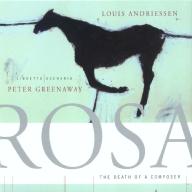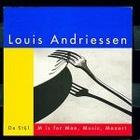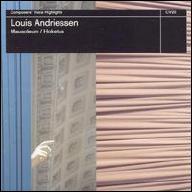Andriessen was born on June 6, 1939, in Utrecht, into a musical family headed by his father Hendrik Andriessen, one of the recognized pioneers of modern Dutch music: his uncle was the pianist and composer Willem Andriessen, and his siblings, Jurriaan and Caecilia, were also composers. Louis Andriessen began his musical studies with his father, and then studied in The Hague with Kees van Baaren, and later in Milan with Luciano Berio. Early Andriessen works are serial, but by 1963, he was working with graphic notation, as in the piano piece Registers, using a combination of fixed and non-fixed elements to facilitate improvisation. In 1969, Andriessen participated in his first large-scale theatrical "happening," Reconstructie, at the Holland Festival in collaboration with Ton de Leeuw, Misha Mengelberg, Peter Schat, and Jan van Vlijmen. In 1970, Andriessen swore off writing music for standard symphonic ensembles for good, a decision that was to profoundly impact his development; in later life, he did write for the orchestra again. For a time, he worked in electronic music and had his first venture into theater on his own with Il Principe. Andriessen experienced a creative breakthrough in 1976, with De Staat, a large choral work based on Plato's Republic sung in the original Greek, combining ancient Greek scales, Stravinskyian rhythms, repetition, and hocket. De Staat earned Andriessen the coveted Kees van Baaren Prize, and following that, he garnered numerous awards, citations, and commissions.
Andriessen often used rock instruments, such as electric guitar, bass, and synthesizer, to augment his ensembles. Andriessen also composed music designed to challenge the talents of specific performers; Forget-Me-Not requires an oboist to also play piano, and in TAO, there is a part for a pianist who speaks and also plays the koto. Andriessen was regarded, to some extent, as an ensemble builder; Orkest de Volharding was formed to play the same-named Andriessen work, and the ensemble came together afterward to program and commission other repertoire. In the United States, performing groups such as the California EAR Unit and Bang on a Can eagerly programmed and recorded Andriessen works such as Workers Union and Hoketus. Younger composers view the work of Andriessen as an alternative to academic serialism and American minimalism, and aspiring composers from many nations visited Holland to study with him at the Royal Conservatory at The Hague. After De Staat, Andriessen's major works included De Tijd, Facing Death for the Kronos Quartet, and Trilogy of the Last Day. He collaborated with stage director Robert Wilson on the four-part De Materie in 1989. In the 1990s, a fruitful collaboration with film director Peter Greenaway led to several works, including the films M is for Man, Music, Mozart; Rosa: The Death of a Composer; and the opera Writing to Vermeer, which premiered in 1999. Sometimes didactic in his defense of his progressive political views, Andriessen was nevertheless far from humorless. His penetrating insight as an essayist on topics such as Stravinsky may be read in his book The Apollonian Clockwork, published in 1989. Andriessen continued publishing music into the late 2010s, and his later works include La Commedia (2008), an opera retelling the story of Dante's Divine Comedy, his final opera, Theatre of the World (2015), and a song cycle dedicated to Nora Fischer titled The Only One (2018). Andriessen died in Weesp, Netherlands, on July 1, 2021. ~ Uncle Dave Lewis & Keith Finke, Rovi















